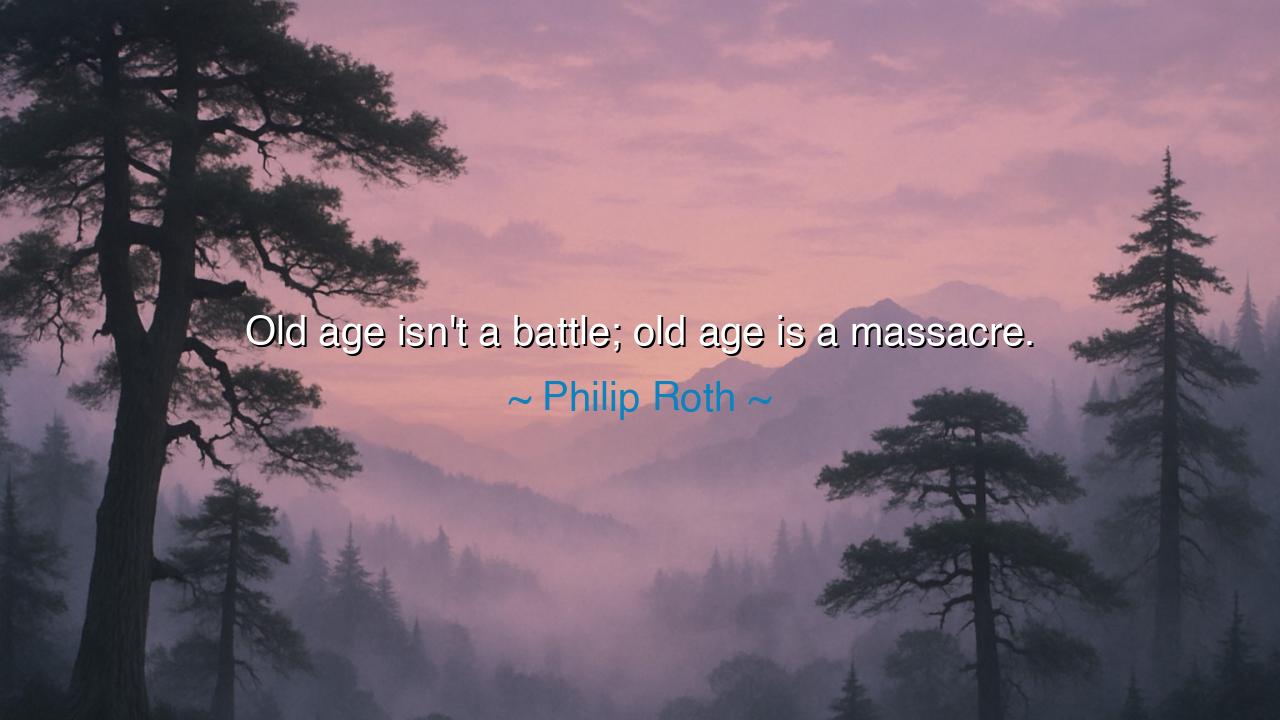
Old age isn't a battle; old age is a massacre.






"Old age isn't a battle; old age is a massacre." — Philip Roth
In these harrowing words, Philip Roth casts a sharp light on the undeniable truth of old age. He does not romanticize it, nor does he paint it with the gentle strokes of nostalgic reflection. Instead, Roth’s metaphor reveals the harshness and brutality of growing old, where the body—once strong and resilient—slowly withers and decays, as if caught in a massacre. The battle of old age, Roth suggests, is not a noble struggle where the individual might emerge victorious through sheer will or resilience. No, old age is an inevitable slaughter, an all-consuming force that takes away vitality, strength, and often, identity itself. It is a reminder that life is fleeting, and that the passage of time has an indiscriminate and unforgiving nature.
This reflection echoes the ancient wisdom of Heraclitus, who famously said, “Character is destiny.” Heraclitus spoke of the inevitable change of life, emphasizing the constant flux that defines human existence. Yet, while Heraclitus embraced change as an essential part of life, he also acknowledged the suffering that accompanies it. In old age, this change becomes more stark, more undeniable, as the human body, once powerful and vibrant, begins to decline. The ancients did not shy away from acknowledging the harsh realities of life, and they saw aging not as a noble endeavor, but as a force that gradually robs one of strength, clarity, and purpose. Roth's words, though modern, resonate deeply with this timeless understanding of the passage of years.
Consider the life of King Lear, the tragic figure from Shakespeare's play. Lear begins the story as a powerful ruler, commanding loyalty and respect, but as he ages, he is consumed by the decay of both his mind and body. His decline is not gradual but sharp, much like the massacre Roth refers to, where Lear is thrust into a world of madness and betrayal. The weight of his years strips him of reason, and he finds himself at the mercy of forces far beyond his control. Shakespeare uses Lear to explore the theme of aging as a destructive force, where what was once whole and strong becomes shattered by the cruel realities of time.
The reality of old age, as Roth describes it, is not just physical but emotional and psychological. The ancients, particularly Socrates, often discussed the fear and humility that come with advancing years. Socrates, when faced with his own death, did not mourn the loss of his life but rather embraced the idea that the soul, not the body, was the true essence of a person. He understood that old age, like death, was an inevitable part of the human condition, one that could not be avoided, but one that should be faced with dignity. However, Socrates’ view was one of acceptance, not resignation—something that Roth seems to argue against. Roth’s vision of old age is a harsh reality, where even the strongest spirit is powerless against the assault of time.
In the more recent world, we witness how old age can become a kind of massacre in the lives of those who once commanded great power. Take, for example, the life of Winston Churchill, the iconic British leader. During his prime, Churchill was a force of nature—his energy, will, and resolve carried the weight of a nation through the storms of war. Yet, as he grew older, his body betrayed him, and the mental clarity he once had began to fade. His final years were marked not by the triumph of his earlier years, but by a slow, almost tragic decline. In his old age, Churchill, once a hero of the people, found himself confronting the same destruction that Roth speaks of—one that no amount of power or will could resist.
The lesson in Roth’s words is one of profound acceptance. Old age, for all its suffering, is a universal experience, one that awaits all who walk the path of life. Roth calls us to recognize that life is fleeting, and that the brutality of old age cannot be avoided, no matter how great or powerful we once were. It is a reminder to live fully in the present, to appreciate the moments we have, and to embrace the changes that come with age rather than fight against them. We must live with the knowledge that all things, including ourselves, are destined to change, and ultimately, to decay.
So, what practical lesson can we take from Roth's reflection on old age? The first step is to value the present—our health, our relationships, and our vibrancy. Let us not wait for age to strip away what we have but to live fully now, in the full realization that time is both a gift and a threat. The second lesson is to cultivate our inner strength—the strength of our character, our mind, and our soul. These are the qualities that age cannot destroy, that time cannot take away, and that will carry us through the inevitable storm of old age. And finally, let us face the end of our lives with courage, knowing that the true measure of a life is not in the number of years we live, but in the way we live each of those years, with passion, integrity, and purpose.






AAdministratorAdministrator
Welcome, honored guests. Please leave a comment, we will respond soon